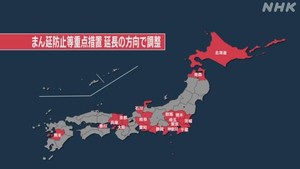News
Japan to Let COVID-19 Quasi-State of Emergency End Nationwide on Monday
posted on by Rafael Antonio Pineda
 Japanese Prime Minister Fumio Kishida announced on Wednesday that the Japanese government will end the COVID-19 quasi-state of emergency in all 18 prefectures where it is still active next Monday as scheduled. Kishida explained that there is "a clear downward trend" in hospital bed occupancy rates, and that new infection rates have gone down by more than 50% compared to when infections were at their peak.
Japanese Prime Minister Fumio Kishida announced on Wednesday that the Japanese government will end the COVID-19 quasi-state of emergency in all 18 prefectures where it is still active next Monday as scheduled. Kishida explained that there is "a clear downward trend" in hospital bed occupancy rates, and that new infection rates have gone down by more than 50% compared to when infections were at their peak.
Kishida emphasized that the pandemic has not ended yet, and asked people to continue following guidelines such as social distancing and wearing masks. He also reported that Japan is securing more vaccination shots for a third booster round for children age 12 to 17, as well as a fourth round later this year for those at high risk.
The Japanese government declared the current quasi-state of emergency in Tokyo, Saitama, Chiba, Kanagawa, Gunma, Kagawa, Aichi, Gifu, Mie, Niigata, Nagasaki, Kumamoto, and Miyazaki prefectures amid the latest rise of COVID-19 cases and hospitalizations. The national government granted the requests from these 13 prefectures from January 21 to February 13, and extended them for the first time to March 6.
The Japanese government also expanded the quasi-state of emergency to 18 more prefectures - including Osaka, Kyoto, and Hokkaido - amid the rise of COVID-19 infections in the country due to the new Omicron variant. Of these, Hiroshima, Hokkaido, Aomori, Fukushima, Ibaraki, Tochigi, Ishikawa, Nagano, Shizuoka, Kyoto, Osaka, Hyogo, Okayama, Fukuoka, Saga, Kagoshima, and Wakayama also extended their quasi-state of emergencies to March 6.
Tokyo, Saitama, Chiba, Kanagawa, Osaka, Kyoto, Hyogo, Hokkaido, Aomori, Ibaraki, Tochigi, Gunma, Ishikawa, Gifu, Shizuoka, Aichi, Kagawa, and Kumamoto had extended their quasi-state of emergencies for a second time to March 21. In Fukushima, Nagano, Hiroshima, Fukuoka, and nine other prefectures, the quasi-state of emergency was lifted as planned on March 6.
As in previous quasi-states of emergency, which have less strict guidelines compared to a full state of emergency, government officials have asked dining and drinking establishments to stop selling alcohol, limit their hours, and limit the number of customers. They have also offered some financial compensation to businesses that comply with the guidelines, and they imposed additional anti-virus measures.
Japan last ended a full state of emergency in 19 prefectures last September. That state of emergency started in July (although Okinawa had then already been under a state of emergency for four months).
Source: NHK